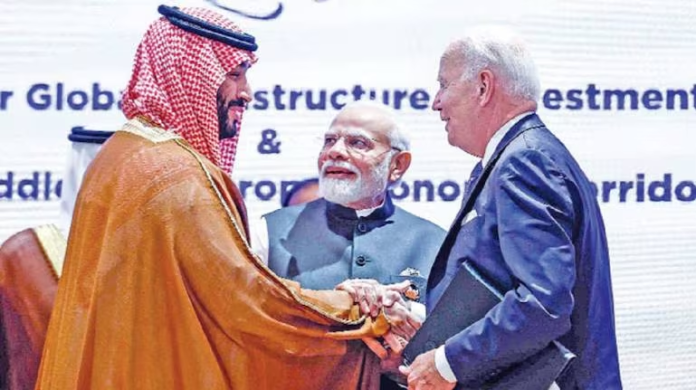A project dubbed IMEC, a unique sea and rail corridor, was intended to connect India to the Middle East and Europe, but the Middle East conflict has thrown the plans into doubt, according to The Telegraph.
At the G20 summit held in New Delhi in September 2023, India announced an ambitious project called the India-Middle East-Europe Corridor (IMEC).
US President Joe Biden declared that the project would offer “endless opportunities,” while European Commission President Ursula von der Leyen called it “the most direct connection to date between India, the Arabian Gulf and Europe.”
Indian Prime Minister Narendra Modi stated that IMEC would become “the basis of world trade for hundreds of years to come,” but the war between Israel and Hamas, as well as the Houthi attacks in the Red Sea, halted the corridor’s progress.
One of IMEC’s advantages is that it will promote economic integration and partnership in the Middle East by connecting the countries of the United Arab Emirates (UAE), Saudi Arabia, Jordan and Israel.
However, the war has seriously deteriorated the security situation, with Saudi Arabia’s and the UAE’s anger over Israel’s bombing of Gaza undermining efforts to improve relations between Israel and some of its Arab neighbours.
IMEC aims to connect goods, energy and data from India to Europe through the Middle East via railway and maritime networks, pipelines and cables. One of the key parts is expected to be a railway network that will connect the UAE, Saudi Arabia, Jordan and Israel.
Saudi Arabia has already committed to investing $20 billion (€18.4 billion) in IMEC, most of which is for the railway network. However, it seems that the fate of IMEC now depends on the war between Israel and Hamas.
The country recently stated that it was still interested in normalising diplomatic relations with Israel after the end of the Gaza war, but claimed it would only do so if the deal led to the creation of a Palestinian state.
On top of that, there are many other questions about the viability of IMEC. One of them concerns Turkey. Ankara has been quick to declare its opposition to IMEC from the outset, as Turkey is not a member of the IMEC project, with the country’s president Recep Tayyip Erdogan declaring after a statement at the G20 that “there can be no corridor without Turkey.”
The Turkish government emphasises its country’s traditional role as a broker between East and West trade and promotes an alternative corridor known as the Iraq Development Road. However, the project requires extensive cross-border investment and co-operation.
Earlier this month, Indian Prime Minister Modi visited the UAE and Qatar as part of New Delhi’s ongoing diplomatic strategy to strengthen ties with Gulf Arab states. Modi signed a bilateral investment treaty in the UAE to enhance economic ties.
The UAE is currently India’s second largest export market, with the countries having signed a free trade agreement in 2023 to boost non-oil trade. Both sides have agreed to rapidly commission an ambitious economic corridor.
In another positive sign that IMEC remains on the agenda, France recently appointed Gerard Mestrallet, former CEO of French energy company Engie, as its official spokesman for the project.
I’d like to convene the representatives of other IMEC member states in a gathering in the next two months.
